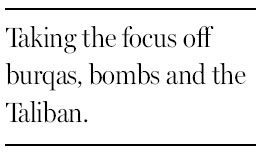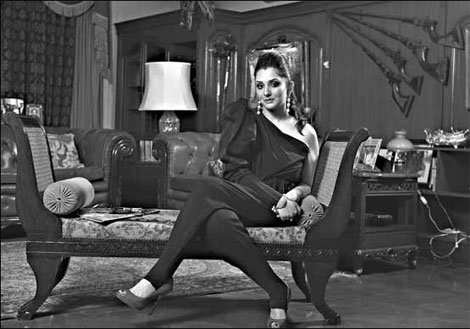A focus on elites in poor Pakistan
Updated: 2012-07-01 08:44
By Declan Walsh(The New York Times)
|
|||||||
|
Despite political turmoil and extremist violence, society magazines have sold well in Pakistan. Zahraa Saifullah Khan, the publisher of Hello! Pakistan. Asim Hafeez for The New York Times |
KARACHI, Pakistan - Can celebrity and fashion save Pakistan from its dark image? That's the proposition of Hello! Pakistan, a glossy new magazine that has opened a window into the lives of the country's gilded elite, and rekindled an old debate about their role in a troubled society.
Hello! Pakistan is the local edition of the British celebrity magazine Hello!, famous for its lightweight interviews with movie stars and lavish photo spreads of aristocrats and minor royalty. But the Pakistani publishers promise something different: an emphasis on their country's "soft side" that cuts across the relentless Western focus on burqas, bombs and the Taliban.
"We're not out to save the world," said Zahraa Saifullah Khan, 29, the magazine's Pakistan-born, England-educated publisher. "But this is a starting point, to show that we're not all a bunch of terrorists with beards."
Many young Pakistani professionals, tired of their country's portrayal as a caldron of chaos, would applaud that idea. But not all agree that airbrushed images of the moneyed upper-crust is the way to achieve it.
"It's life within the bubble," said Shakir Husain, a software entrepreneur who set up Fashionistas Against the Taliban, a satirical Facebook group that has acquired cult status in Pakistani social media. "And that bubble is filled with self-congratulatory nonsense."
The magazine is the latest assertion of a celebrity culture that has thrived in Pakistan in the past decade despite political turmoil and extremist violence. Glossy society magazines have sold well, showing well-heeled wealthy Pakistanis at lavish parties, weddings and charity balls.
The glamour, meanwhile, comes from the fashion industry. Designers anchor the celebrity party scene, while models, who can earn $1,000 a night on the catwalk, showcase sexy clothes in a country where public displays of flesh are frowned upon.
But championing the rich and glamorous can be controversial in a country with a dizzying social gulf and a flailing economy; where much wealth stems from inheritance, corruption or contacts; and where the top tier of society is notoriously bad at paying its fair share of taxes or, indeed, any taxes at all.
The debate was embodied by one of the hottest fashion labels, Sana Safinaz, after it ran billboard advertisements in March that showed aging train porters - still known by the colonial term "coolie" - holding Louis Vuitton luggage for a lithe model in flowing dress. "How Uncoolie" read one headline.
Then Hello! Pakistan interviewed the brand's two designers at a seaside mansion; one, Safinaz Muneer, boasted how employees could spend 1,500 hours embroidering a dress "that will cost you nothing."
To critics, it reflected the tone-deaf sensibilities of an increasingly disconnected elite.

The fashion-fueled celebrity boom stems from the withering of other forms of expression. While Bollywood dominates Indian pop culture, Pakistan's movie business has been crushed by Islamic nationalists. Traditional South Asian dances, deemed "un-Islamic" by conservatives, have waned. Pakistani writers have excelled abroad, yet struggled to gain widespread recognition at home. The threat of Islamist violence has stymied pop concerts and sports events.
The resulting vacuum, said Faiza Sultan Khan, a literary editor and critic, has pulled Pakistanis in conflicting directions - toward religion or Western-style consumerism. "Consumerism has become the art form, and fashion is responding to that," she said. "That's what happens when you have a society with no shared culture."
Ms. Khan, Hello! Pakistan's publisher, said the sales figures - a healthy 15,000 copies per issue - spoke for themselves. "It's easy to sit in a drawing room and bitch about everything that has gone wrong with Pakistan. You've got to do your part."
Others are uncomfortable with the reality that Hello! portrays but, in a country shadowed by dark forces of intolerance, glad that it simply exists.
"The rich inhabit a parallel reality everywhere, although in Pakistan their opulence seems excessive because the middle class is so stunted," said Moni Mohsin, a writer who specializes in social satire. "But if it was a stark choice between life in the pages of Hello! or as Osama bin Laden would have wanted it, I'd go for Hello! It might drive me mad, but everyone has a right to a party."
The New York Times
(China Daily 07/01/2012 page19)
